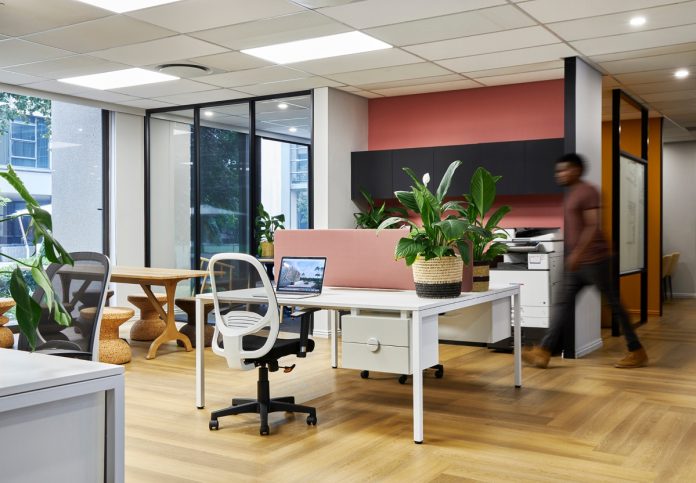Sustainable workspaces are so much more than a design trend. They are a critical component in the global response to climate change, says Steven Fish, Director at Tétris Design and Build.
Undoubtedly, businesses play a pivotal role in shaping our environment – for better or for worse. By envisioning and realising sustainable workplaces, they possess the power to significantly pare down their ecological footprint. Constructing eco-friendly workspaces isn’t about starting anew with solely eco-friendly fittings and furnishings. Rather, it’s about leaning into and embedding the principles of the circular economy. This is based on three principles, driven by design: eliminate waste and pollution, circulate products and materials (at their highest value), and regenerate nature. It is possible to make the economy work for people, business and nature throughout the design process. It’s also an active, conscious step towards green business practices, signifying a critical part of our collective journey to a sustainable future.
Mindfulness in creating a working balance
Consider that 17 billion pounds of office assets are discarded in landfills each year, according to the US Environmental Protection Agency, and that the manufacture of one standard office task chair results in an average of 72kg CO2e in carbon footprint or that a common visitor’s chair causes 36 kg CO2e and a standard office desk produces 45 kg CO2e. One of the most effective means of achieving sustainable workspaces is through mindfulness when designing and implementing furniture and fittings. It must no longer be a case of ripping out the old, to replace with the new. Instead, spaces should approached with the mindset of sustainability at every stage of development. At the forefront of the sustainable furniture movement, the Tetris Sustainability Code is a best practice methodology for applied sustainability measures based on leading global sustainable green certifications. It includes the repurposing and refurbishing of furniture as one of its key pillars along with the selection of environmentally-responsible materials and the consideration of individual wellbeing in the design and build phases. These are all measurable deliverables for achieving global green certification in the creation of sustainable business spaces that foster a balance in both productivity and wellness.
Sustainability is regenerative and locally-focused
In relation to sustainable furniture solutions, we focus on enabling a circular approach for the creation of furniture that is made from recycled materials, designed to be durable and long-lasting, and easily repaired or recycled when it is no longer needed. This can help to reduce the environmental impact of furniture production and consumption and create a more sustainable furniture industry. We source locally wherever possible, working with local designers and manufacturers to create feature pieces. Suppliers such as James Mudge and Houtlander produce beautiful items of furniture and the fact that they are produced locally means they have a lower carbon footprint, in addition to supporting local businesses and creating jobs for the craftspeople they employ.
Other benefits of embedding a circular approach include a reduction of waste, pollution and greenhouse gas emissions. Resource efficiency is increased by reducing the amount of resources that are needed to produce new products, which helps to conserve natural resources. Economic benefits are realised through the creation and support of new businesses and jobs in the recycling, repair, and refurbishment sectors, which helps to boost the economy and create a more environmentally-conscious future.
Practical, proactive approach to sustainable furniture solutions
When buying office furniture the important point to remember is that buying cheaper furniture eliminates the long-term use and refurbishment potential that comes with buying well-designed, engineered and manufactured pieces. For example, the average office task chair can have a life cycle of between 10 and 12 years, which provides excellent return on the original investment over a longer life cycle and ultimately prevents wastage.
Thorough furniture audits are required to go beyond just recovering and replacing missing or broken pieces. Through an application of design thinking and flexible manufacturing, furniture pieces can be repurposed, recoated, refurbished and reupholstered. New components can be engineered to integrate with the existing pieces. All of which contributes significantly to an active, thriving circular approach for office fittings.
Placing humans at the centre of work
Today, businesses are increasingly looking for ways to create sustainable workspaces that are both productive and human-centered. Sustainable furniture solutions can play a key role in achieving this balance. By using sustainable materials, designing furniture for durability, and providing maintenance services, businesses can create workspaces that are good for the environment and good for their employees. Sustainable furniture can also help to create more productive, human-centred ways of working. For example, furniture that is designed to be ergonomic can help to reduce stress and improve employee health. Furniture that is made from sustainable materials can help to improve air quality and create a more comfortable work environment.
A blended approach of recycling and refurbishing, sourcing locally and responsibly, and buying the best engineered and designed products that manufactured with best sustainable practice for substantial ROI and longevity of use is design-centred, human-centred, and perhaps most importantly – future-focused.




